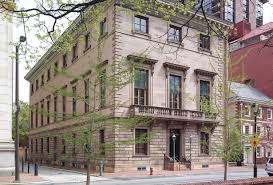Related Topics
Right Angle Club 2017
Dick Palmer and Bill Dorsey died this year. We will miss them.
Bedroom City?

|
| The Atheneum of Philadelphia |
At the annual stockholders meeting of the Atheneum of Philadelphia, high society was out in force. Less expected was the featured speaker, Inga Saffron, the architectural historian and commentator of the Philadelphia Inquirer, who gave a keynote address concerning the recent evolution of the city into a bedroom suburb. That is, she attributed this change to a movement among builders to transform large landmark buildings, like churches, into row houses in a ratio of about eight townhouses to one church. That, in turn, was attributed to the ten-year tax abatement for new construction, which seem to her to be at the root of the recent transformation of Philadelphia from an industrial town into a place to live. That is, a reversal of the trend started in the 1920s when the automobile caused a flight of the residents into the suburbs.
Before the meeting had begun, the new Treasurer of the Atheneum, Donald Roberts, had been privately giving his answer to my customary question, of whatever happened to Philadelphia -- by some accounts the richest city in the world in 1900 -- to decline and decay into the defeated old town of 1950. Don's answer was the city-county consolidation of 1856. This rather arresting explanation centered around the tax wall created at the city's new border, separating the much cheaper land in the surrounding counties by a wide strip of green farmland. To move further out, meant giving consideration to moving from the City entirely, initially provoking hostility from older businesses of Montgomery County. But eventually it, in turn, caused family-owned businesses to cash out and sell corporate control to the stockholder controlled corporations peddled by Wall Street, which were essentially destroying the social fabric on which the city rested. A family-owned business is local and expects corporate control to pass to other locals who attend local social functions. Nowadays, however, if you are looking for a new CEO you don't pick the best dancer in the local Assembly Ball, you hire a head-hunter to look around for somebody in San Francisco. Such a person sees nothing unusual in borrowing from a San Francisco bank, which the locally born CEO might regard with horror, even if it might be a quarter of a point cheaper.
Thus, the city became oriented toward cheaper prices, instead of factoring in other considerations for decision. It's a plausible recounting, offering a different attitude toward changes in the social scene, and hence to modification of the tax code, or dynamic scoring of tax strategies, like enlarging the boundaries of the city at the expense of suburban competitors. It really sounds as if there might be two ways to look at things, especially historical matters. You hesitate to tear down a building where your grandfather started his company, for example, because someone whose ancestors came from the Balkans sees the same building as just an old eyesore in the road of progress.
Such considerations may not directly affect decisions like enacting a tax incentive to accept short term tax loss in order to create long-term tax ratables, but they certainly have an indirect effect. Who is going to benefit, and at whose expense? The builder who tears down the building will either go bankrupt or retire to some other city; the person who treasures the past is likely to expect his grandchildren to benefit in the future. Such underlying attitudes are apt to surface in the form of a question: "Who will be living there if the tax abatement has run out, and the stimulus to prosperity is forced to disappear?" To put it another way, who will willingly send his children to a lousy school?
Originally published: Wednesday, April 05, 2017; most-recently modified: Tuesday, May 14, 2019